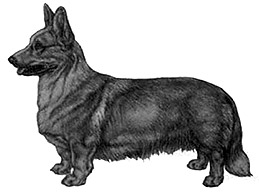Breed standards
Welsh Corgi (Cardigan)
Breed standards are the official guidelines that describe the ideal characteristics, temperament, and appearance of a breed and ensures that the breed is fit for function with soundness essential.

Kennel Club, London 1994
FCI Standard No 38
Amended November 2015
Sturdy, tough, mobile, capable of endurance. Long in proportion to height, terminating in fox-like brush, set in line with body.
Alert, active and intelligent.
Alert, intelligent, steady, not shy or aggressive.
Head foxy in shape and appearance, skull wide and flat between ears tapering towards eyes above which it is slightly domed. Moderate stop. Length of foreface in proportion to head 3 to 5, muzzle tapering moderately towards nose which projects slightly and in no sense blunt. Underjaw clean cut. Strong but without prominence. Nose black.
Medium size, clear, giving kindly, alert but watchful expression. Rather widely set with corners clearly defined. Preferably dark, or to blend with coat, rims dark. One or both eyes pale blue, blue or blue flecked, permissible only in blue merles.
Erect, proportionately rather large to size of dog. Tips slightly rounded, moderately wide at base and set about 9 cms (3 &1/2; ins) apart. Carried so that tips are slightly wide of straight line drawn from tip of nose through centre of eyes, and set well back so that they can be laid flat along neck.
Teeth strong, with scissor bite, i.e. Upper teeth closely overlapping the lower teeth and set square to the jaws.
Muscular, well developed, in proportion to dog's build, fitting into well sloping shoulders.
Shoulders well laid, angulated at approximately 90 degrees to upper arm; muscular, elbows close to sides. Strong bone carried down to feet. Legs short but body well clear of the ground, forearms slightly bowed to mould round the chest. Feet turned slightly outwards.
Chest moderately broad with prominent breast bone. Body fairly long and strong, with deep brisket, well sprung ribs, clearly defined waist. Topline level.
Strong, well angulated and aligned with muscular thighs and second thighs, strong bone carried down to feet, legs short; when standing, hocks vertical, viewed from side and rear.
Round, tight, rather large and well padded.
Like a fox's brush set in line with the body and moderately long (to touch or nearly touch ground). Carried low when standing but may be lifted a little above body when moving, not curled over back.
Free and active, elbows fitting close to sides, neither loose nor tied. Forelegs reaching well forward without too much lift, in unison with thrusting action of hindlegs.
Short or medium of hard texture. Weatherproof, with good undercoat. Preferably straight.
Acceptable colours are blue merle, brindle, red, sable, tri colour with brindle points and tri colour with red points.
All of the above with or without the typical white markings on head, neck, chest, underparts, legs and feet, white tail tip. White should not predominate on body or head where it should never surround the eyes. Nose and eye rims must be black. Liver and dilute colours highly undesirable.
Ideal Height: 30 cms (12 ins) at shoulders.
Weight in proportion to size with overall balance the prime consideration.
Any departure from the foregoing points should be considered a fault and the seriousness with which the fault should be regarded should be in exact proportion to its degree and its effect upon the health and welfare of the dog.
Male animals should have two apparently normal testicles fully descended into the scrotum.



